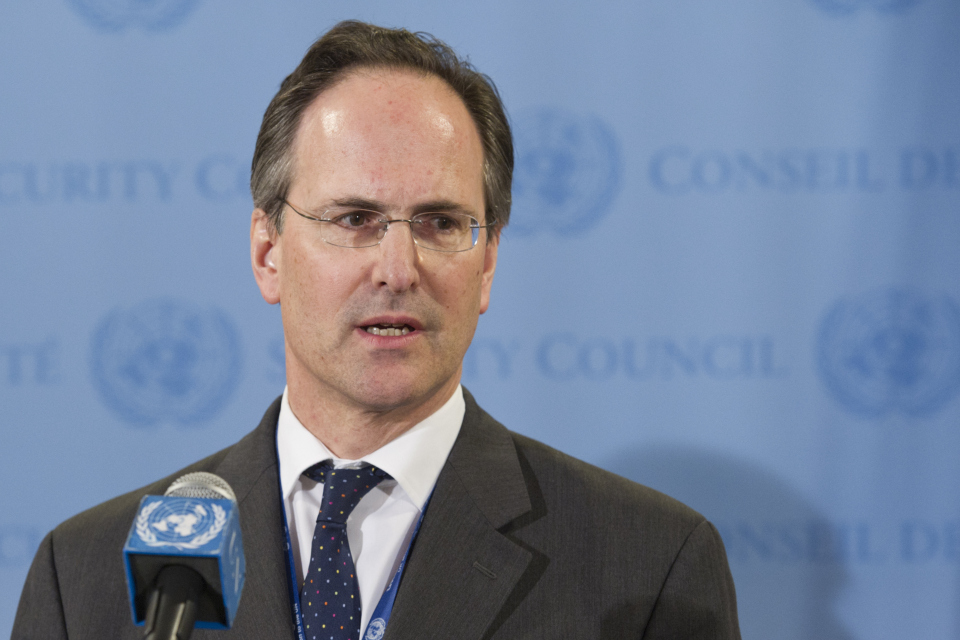A stable, secure and prosperous Afghanistan is in all our interests
Deputy Permanent Representative Philip Parham delivers UK intervention at the Security Council debate on Afghanistan.

Thank you very much.
Mr President,
Let me start by thanking the Secretary-General for his report and his statement this morning. We also welcome back to the Council Special Representative, Jan Kubis. I would also like to thank too, Ambassador Tanin for his contribution to today’s debate and thank Foreign Minister Carr and the delegation of Australia for their leadership on this issue in the Council.
Mr President,
The United Kingdom welcomes today’s adoption of resolution 2096 (2013), renewing UNAMA’s mandate for a further 12 months. Let me take this opportunity to note the continued leadership of the SRSG and the hard work of his staff throughout the past year.
Mr President,
I would like to focus my comments today on four key areas: the transition of security to the Afghan National Security Forces; progress and prospects on peace and reconciliation; preparations for elections in 2014; and, more broadly, the international community’s long-term commitment to Afghanistan.
Turning first to the security transition to the Afghan National Security Forces, let me pay tribute to all the women and men of the ISAF [International Security Assistance Force] mission in Afghanistan and the members of the Afghan National Security Forces who work alongside them. They continue to carry out their duties with great professionalism and courage. The United Kingdom is grateful for their outstanding contribution to the peace and security of Afghanistan.
ISAF has continued to transition security to the ANSF on schedule. This year, with the announcement of Tranche 5, the ANSF will take lead responsibility for the security of the whole Afghan population, approximately 27 million people.
As the ANSF continues to grow in confidence and operational experience, so the confidence the Afghan population has in them will grow. We remain convinced that they will be ready and willing and able to effectively manage Afghanistan’s security after 2014, and tackle any residual insurgent threat. They will have the full support of the United Kingdom and of the international community in doing so.
But tackling security concerns is only part of the picture. Tangible and lasting progress on peace and reconciliation must go hand in hand with this. In recent months, we have seen a strong consensus emerge that a broad, inclusive political settlement offers the best prospect for peace and stability in Afghanistan.
We particularly welcome the efforts of Afghanistan and Pakistan to strengthen their relationship and their common understanding of the Afghan peace and reconciliation process.
In February, the leaders of both countries agreed to increase cooperation between military and intelligence establishments, to strengthen coordination of Taliban prisoner releases from Pakistani detention, and to support the opening of an office in Doha for the purpose of peaceful negotiations between the Afghan High Peace Council and authorised representatives of the Taliban.
This sends a clear message to the Taliban: now is the time to participate in a peaceful political process.
Another pillar in a sustainable peace will be credible elections that reflect the will of the Afghan people. Afghan-led preparations for Presidential and Provincial Council elections in 2014 have started, and decisions have been taken on issues such as voter registration. But time is short and the Afghan Parliament should now prioritise consideration of electoral reforms. It is also important that the Independent Election Commission and Afghan authorities work to establish credible mechanisms to deal with complaints and prevent fraud.
Mr President,
I have on many occasions emphasised the UK’s long-term commitment to the Afghan people. Let me do so again: the United Kingdom will deliver on all our commitments to Afghanistan, now and beyond 2014.
The United Kingdom’s support for Afghanistan will be defined by more than just security. We will pursue a relationship built on prosperity, diplomacy and development, as set out in the Enduring Strategic Partnership Document signed in 2012.
Mr President,
The Afghan Government, with the support of the international community, should continue to make further progress on the areas that underpin sustained economic growth and development. This includes, in particular, areas such as education, health and other basic services for women and girls, as well as strengthened respect for human rights so that all can play a full part in the collective life of a stable and prosperous Afghanistan.
In order to achieve our shared objectives, mutual, accountability is of paramount importance. The United Kingdom attaches great importance to this, and will seek to play a major role in supporting our shared responsibilities: holding each other to account for the promises which we have made. We look forward to co-chairing the first Ministerial review of progress against the Tokyo commitments in 2014.
Mr President,
As Afghanistan moves from transition into the ‘Transformation Decade’ we are focused on the great opportunities and challenges which wait ahead. A stable, secure and prosperous Afghanistan is in all our interests and it is nothing less than this that the Afghan people deserve.
Thank you.